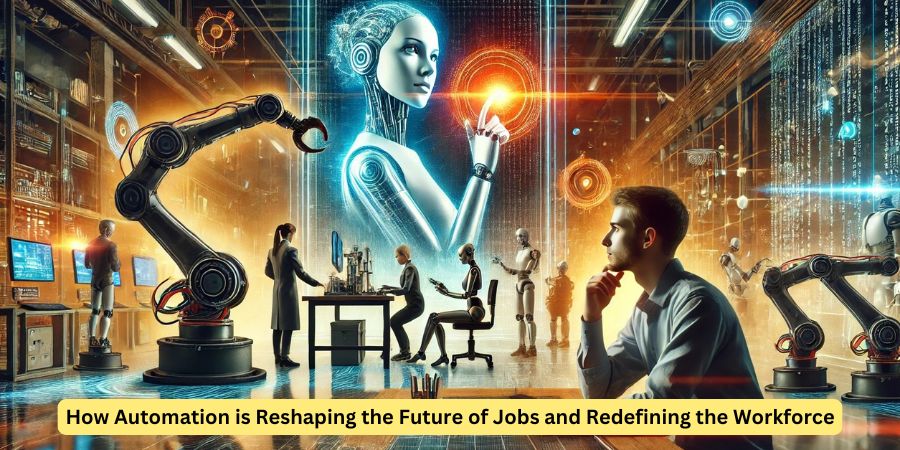The automation of industry is in the midst of phenomenal change in today’s fast world. This means automation is changing how offices work and their floors-from transforming industries that deal with making to creating a difference by bringing advanced technology into people’s workspaces. And as this
technology keeps on evolving, understanding the impact that automation might bring about into the future of jobs and how they will influence and mold both individuals and the industry is important.
The Rise of Automation: What It Means for the Workforce
Automation, as described simply as the execution of tasks with minimal human interaction via technology, is not a new phenomenon. For the past several decades, companies have been incorporating machines into their systems in order to find efficiency improvements across different industries. With the development of artificial intelligence, robotics, and machine learning, automation can be done in ways that are thought not possible for it to do, which only human workers were involved in.
Such wide utilization of automation and machinery generates tremendous implications for jobs in the future. Routine, repetitive work—be it data entry, most basic manufacturing processes, or even some customer service functions—is increasingly automated. It raises fears of losing millions of jobs that millions of people have traditionally performed as more machines assume such roles. At the same time, new jobs are also created, based on ever more specialized skills.
Job Displacement vs. Job Creation: A Delicate Balance
One of the most highly discussed debates that have to do with automation is job displacement. Given studies, manufacturing, retail, and transport sectors will lose heavily sized portions of their human workforce when machines and AI systems start taking on manual and administrative tasks. For instance, some of these include self-driving trucks, automated checkout systems, and robotic assembly lines, threatening to reduce human needs in all sorts of sectors.
Automation is not related to job loss, though. The impact on employment will be mixed-it creates some new types of work, primarily related to technologies and digital transformation. For example, companies increasingly require experts in software development, AI research, data science, and cyber security as they seek highly skilled persons for management and optimization purposes. In addition, non-industrial sectors, such as the health, education, and artistic sector, are also expected to grow because automation usually does not displace but augment professional human talent.
The Future of Jobs: The Human-Centric Century
The future of jobs will have to be in roles that are less automatable while machines take on more routine tasks. Some of them include the jobs which require critical thinking, creativity, emotional intelligence, and interpersonal skills. These qualities technology, at least for now, cannot replicate.
Health care and social work related sectors will not have much reduction in this regard. Nurses, teachers, therapists, and carers are most likely to be key members of society for many years to come. Artistic professions such as writers, artists, and designers are bound to flourish because human creativity and ingenuity will always surpass machine duplication.
This shift provides workers with an important opportunity to develop and enhance these skills that are human-centered, thus making it more susceptible to the future world of automation.
How Industries are Adapting to Automation
It has also led to different faces regarding the adaptation of the growing automation industries in the world. For example, to sectors such as manufacturing and logistic, it is being fully adopted to assist in managing and boosting yields at a reduced cost. For example, organizations embrace the AI-powered robots and machines that would be used to enhance precision and make the operations more efficient on an assembly line, greatly upgrading production speed while at the same time making fewer errors.
Retailing is instead taking the hybrid route: where machines can be entrusted with taking care of some tasks, like management of the inventory and processing of the checkout, but humans are still required for customer service functions that inherently need human touch. Retailers want to deliver seamless experiences for the customers who are at the center of all these, paying a lot of attention to automation that delivers greater value along with its own employees.
For example, finance involves highly specialized fields where automation shifts the analysis of data and fraud in such fields. By employing algorithms through machine learning, it is relatively easier and faster to scan over broad volumes of financial data to identify pertinent patterns or likelihood threats, thereby freeing human workers to concentrate on strategic decision-making.
Role of Upskilling and Reskilling
Upskilling and reskilling are going to be the most important preparation regarding the utilization of automation in transforming the future of jobs. Workers must develop the new skills to compete in an increasingly automated job market resulting from changes brought about by automation.
Upskilling means getting newer skills, presumed to be in the same job. The reskilling is actually meant when employees are required to be trained for completely new jobs. Like, a factory worker might be required to undergo training to operate and troubleshoot automated machinery; similarly, a customer care representative might need digital skills of running AI-driven chatbots.
Helping facilitate all this must come from governments, educational institutions, and business organizations. Investment in workforce development programs, lifelong learning, and accessible training to get workers into new roles where automation benefits companies and workers alike could be helpful.
Conclusion: The Future of Work with Automation
Automation can no longer wait till some indefinite future; it is actually crafting the present and the future of jobs. However, opportunities to make a difference abound to those who want to adapt to the change, and people and industries need to focus on the need for continuous learning, developing human-centric skills, and augmenting human labor with the power of technology. Understanding how automation will change our workforce and taking steps now will better prepare us for the future of jobs and ensure that it thrives with reality well into the years to come.
Read Also: The Benefits of Early Learning Centres in Melbourne




